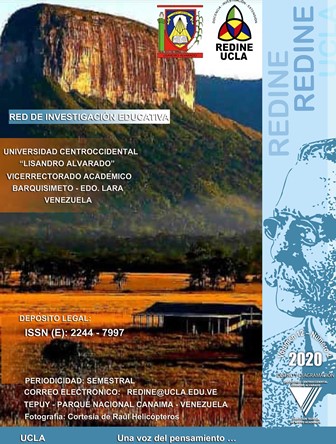the investigative competences of the Bolivarian Primary Education teacher
Abstract
The purpose of this essay is to present a reflection on the importance of the investigative competences of the primary education teacher from learning to be, learning to know, learning to live and learn how to do it. Delors (1996) are competences to develop what Throughout the life of the human being in order to achieve success as professionals, human beings and contribute to raising the quality of education. For today's society requires updated teachers to face the challenges that arise and thus be able to propose alternative solutions to the transformational moments experienced by Venezuelan society. The development of research competencies in the 21st century research teacher, proposes a change from the paradigm of the master transmitter of knowledge to a creative teacher and researcher, transformer of the educational environment, proposing strategies for solving the problematic situations of the classroom, in the context community, environmental and its pedagogical practice to achieve educational quality.
Downloads
References
Contreras, Zeneyda de Jesús (s/f). Las competencias Investigativas [Consulta agosto2014]. Disponible:www.educando.edu.do/files/.../Las_Competencias_Investigativas1.pdf .
Currículo Subsistema Educación primaria Bolivariana (2007). República Bolivariana de Venezuela. Ministerio del Poder Popular para La Educación Fundación Centro Nacional para el Mejoramiento de la enseñanza de Ciencia.
CENAMEC Impreso fundación imprenta Ministerio del Poder Popular Para la Cultura. Caracas septiembre 2007.
Delors, Jacques (1996). La Educación Encierra Un tesoro. Informe a la UNESCO de la comisión Internacional sobre la Educación para el siglo XXI. Ediciones UNESCO. [Consulta mayo 2015]. Disponible http://www.rau.edu.uy/docs/delors_s.pdf.
Jaik Dipp, Adla (2013). Competencias investigativas. Una mirada a la Educación Superior. Instituto Politécnico Nacional Ciidir Unidad Durango. Primera edición octubre de 2013. Editada en México. ISBN: 978-607-9063-17-7[Consulta marzo 2015].
Galvis, Rosa Victoria (2007). De un perfil docente tradicional a un perfil docente basado en Competencias. Acción Pedagógica N° 16/ Enero- Diciembre, 2007-pp. 48-57. Recuperado 5 de septiembre del 2014 en http://dialnet.unirioja.es/descarga/articulo/2968589.pdf.
López Balboa, Lugarda; Pérez Maya y Cáceres Mesa, Maritza (2004). Maestro Investigador. Un Reto en la Formación del Profesor de Ciencias .Revista Pedagógica Universitaria. Vol. 9 3 2004.Recuperada 29 .Disponible htt://cvi.mes.edu.cu/peduniv/index.php/peduniv/article/download/294/285 [Consulta marzo 2015].
Márquez Valdés, Annia María y Acosta Bandomo Rafael Urbano (2013). Reflexiones Teóricas sobre la formación y desarrollo competencias investigativas. E F Deportes. Com, Revista Digital. Buenos Aires, Año 1N° 186, Noviembre de 2013.. Disponible http://www.efdeportes.com/efd186/desarrollodecompetenciainvestigativas.htm [Consulta 8 de agosto 2015]
Published
How to Cite
Issue
Section
Copyright from the year of publication
This work is licensed under a:
Creative Commons Reconocimiento-NoComercial-CompartirIgual 4.0 Internacional (CC BY-NC-SA 4.0)
The opinions expressed by the authors do not necessarily reflect the views of the publication's editor or UCLA. Total or partial reproduction of the texts published here is authorized, provided that the complete source and the electronic address of this journal are cited. Authors have the right to use their articles for any purpose, provided it is done on a non-profit basis. Authors may publish the final approved version of their work online or in any other medium after it has been published in this journal.




